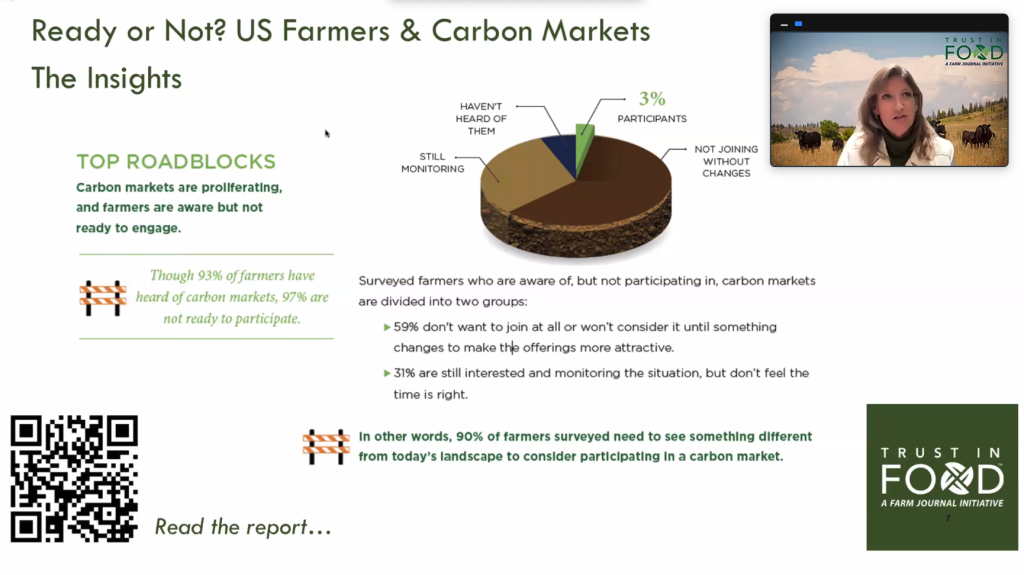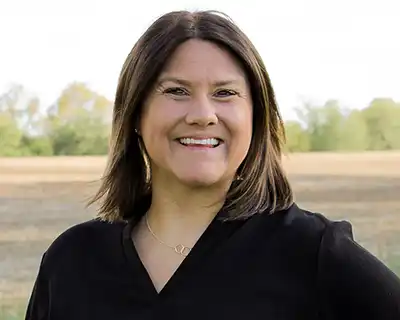Making sense of evolving carbon markets and understanding their on-farm implications is not for the faint of heart. Mitchell Hora, CEO of Continuum Ag, seventh generation Iowa farmer and advocate for regenerative agriculture, has made it his mission to help producers navigate the carbon conversation.
Most recently, Hora and Trust In Food President, Amy Skoczlas Cole, talked shop about soil health and carbon label standards in Hora’s TopSoil series webinar, “Carbon Intensity, Taming the Wild West of Carbon.”
“The thing that you and I have gelled over is not just soil health—there’s lots of folks who are thinking about soil health. What drives me and I think drives you is, ‘How do we find really pragmatic solutions that help farmers on the journey to continuing to improve soil health, continuing to be stewards of the land, water and air?’” Skoczlas Cole said. “Where does the rubber hit the road and how do we actually figure out how we support producers along the way?”
In the hour-long discussion, the two leaders debated the promise and perils of new carbon labels in the marketplace, the shift away from carbon offsets and opportunities for farmers and ranchers to get credit for, track and communicate innovative production practices happening on farm.
Measuring molecules: the limits of carbon labels
When it comes to putting carbon and sustainability labels on animal ag products, “we need to be really careful about greenwashing,” said Skoczlas Cole.
At the end of the day, the full value of what the producer is offering on the landscape needs to translate, she continued. Good grazing management offers a host of ecosystem benefits—think open space preservation, habitat restoration, wetland protections—beyond just carbon molecules.
“I would take a grazing pasture over a subdivision any day across our landscapes,” said Skoczlas Cole. “I think that’s something that a low-carbon label does not take into account.”
Despite the opportunity to develop deeper, more comprehensive standards in some carbon label programs, Skoczlas Cole was encouraged by the growing popularity of marketing value-added commodities, over promoting a separate entity such as carbon credits.
“I believe that we have to broaden the conversation beyond just low carbon,” Skoczlas Cole said. “Americans love our cowboys. There’s great consumer research that farmers and ranchers are the most believable people in the U.S., and Americans want to hear stories about what it’s like to do this because only 2% of Americans get to do it anymore. If we can reconnect to the roots of what this is all about—rather than counting the molecules—we will be so much better off.”
Zoom out: the chasm between awareness and adoption
The limits of low-carbon labels aside, right now the major hurdle to getting these highly differentiated products on the shelf is producer buy-in and participation. A recent Trust In Food report, “Ready or Not? U.S. Farmers and Carbon Markets”, underlined producer reluctance to participate. The research found that among farmers and ranchers, while there was broad awareness of carbon markets, only a small fraction of producers said they were ready to join.
“93% of farmers know about carbon markets, but only 3% of farmers have actually participated in them,” said Hora, citing the report.

“The thing I want carbon markets to hear is that something has to change if we’re going to reach the mainstream of American agriculture with this possibility,” Skoczlas Cole said.
“They’re not saying they would never do it,” agreed Hora. “They’re saying, ‘Hey, I would love to do something here, but I just I’m not going to sign up for the offer as it is today.’”
“We can bemoan how poorly structured carbon markets are for annualized systems—they were never designed for that,” said Skoczlas Cole. “But in the world of animal agriculture, we actually have an opportunity with Climate-Smart Commodities to reimagine…how we think about the metrics.”
In this way, USDA’s Partnerships for Climate-Smart Commodity grant programs represent a new path for producers to reimagine how to get credit for, track and share sustainability data around innovative production practices happening on the ground. Trust In Food won $40 million in Climate-Smart Commodity grant funding in 2022 for its Connected Ag Project. The program incentivizes farmers to implement practices like cover crops and grazing management, while also delivering technical assistance and data-management support to track on-farm outcomes.
“Our grant is really focused on this,” said Skoczlas Cole. “We’re doing two things: We’re using data that we have within the functional ecosystem to help match producers up with solutions and practices that makes sense for their operation. Then, we are also partnering each enrollee in our program with a data provider to help gather the data and then with the data coach. It’s not just the solution, but it is also the coach that sits next to them and helps them figure out how to find value in it.”
Watch and listen to the entire TopSoil webinar, “Carbon Intensity, Taming the Wild West of Carbon” on YouTube and Spotify.


